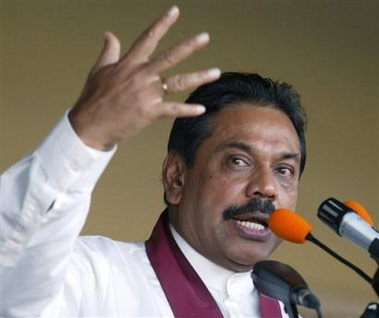 Sri Lankan President Mahinda Rajapaksa chose the nation’s first independence day since the end of the civil war to call on the Tamils to work with the government but he ruled out self-determination. Rajapaksa spoke in Tamil in Kandy today where he appealed to the ethnic minority to “solve our problems ourselves through discussions”. He said independence day had assumed greater significance as it was the first since the defeat of Tamil Tiger rebels last year."The freedom from colonial rule that we gained 62 years ago is now more meaningful because we have been liberated from the forces of separatist terror that marred our freedom for nearly half that period," he said. The speech was his first public address to the nation since his re-election as president last month. (photo credit: AP/Eranga Jayawardena)
Sri Lankan President Mahinda Rajapaksa chose the nation’s first independence day since the end of the civil war to call on the Tamils to work with the government but he ruled out self-determination. Rajapaksa spoke in Tamil in Kandy today where he appealed to the ethnic minority to “solve our problems ourselves through discussions”. He said independence day had assumed greater significance as it was the first since the defeat of Tamil Tiger rebels last year."The freedom from colonial rule that we gained 62 years ago is now more meaningful because we have been liberated from the forces of separatist terror that marred our freedom for nearly half that period," he said. The speech was his first public address to the nation since his re-election as president last month. (photo credit: AP/Eranga Jayawardena)But the international Tamil community is no mood to quickly forgive the Singhalese leader after his brutal suppression of the 25-year uprising last year. The Australasian Federation of Tamil Associations said the Tamil Diaspora continues to mourn Independence Day as it marks the beginning of national oppression. It says when Britain granted independence to Sri Lanka in 1948, it failed to provide a federal arrangement for Tamils and Singhalese to share political power. They say this paved the way for the majority to systematically and consistently discriminate and brutally oppress the Tamils and led to the struggle that followed. “The Sri Lankan state’s genocidal attack on the Tamil people in 1983 lead to a 26 year long armed conflict that ended on 18 May 2009 with the defeat of the Liberation Tigers of Tamil Eelam,” they said.
Similarly the British Tamils Forum dismissed Rajapaksa's claim to want to resolve ethnic tensions. Suren Surendiran, a senior member of the Forum told Al Jazeera Rajapaksa has been saying that forever. "Mr Rajapaksa has proven to be a very oppressive and discriminating president. The Tamils are not celebrating today as an independence day,” he said. “Rajapaksa was not voted in the north and east, where the Tamils are - it's their land."
And while Rajapaksa was probably appealing in vain to the Tamils in the centre of the country, back in the capital 5,000 supporters of his defeated opponent, former army chief General Sarath Fonseka, took to the streets to protest the results. Rajapaksa has sacked a dozen senior military officers in the aftermath of the election. He accused the officers of breaching military discipline and siding with Fonseka. He also said they were plotting to stage a coup and assassinate him. Some of the officers were arrested after troops surrounded a hotel in Colombo last week claiming there were army deserters inside. Sri Lankan Foreign Minister Rohitha Bogollagama said it was a pre-emptive action by Fonseka. “[They were] trying to occupy premises in the city,” he said. “These are not done in a democracy.”
At a news conference on Saturday Fonseka strongly denied the claims of a coup but said a number of army officers had given him inside information during his campaign. “The information given by these officers pertained to efforts by the campaign managers of Mr. Rajapaksa to defame and assassinate me,” he said. Most of the officers forced to resign were closely aligned to him. In the election on 26 January, Rajapaksa defeated him by a large margin 58 to 40 percent.
According to the BBC there were a number of factors that helped Rajapaksa win so easily. They cited his “fiery rhetoric and sure popular touch” as well as his emphasis on the primacy of his role in last year's war victory. There is also little doubt that ordinary people's sense that their streets are safer than they have been for the past 30 years played a major role. But the Tamil minority voted in the main for Fonseka and ethnic tensions remain as strong as ever despite the end of the war.
There are also fears of a crackdown on democracy now that Rajapaksa has the best part of another seven years to rule the country. Media and human rights groups accuse him of closing and blocking news outlets and harassing, assaulting and detaining journalists who it claims were biased towards Fonseka. Human Rights Watch say that since the election authorities have detained and questioned several journalists, blocked news websites, and expelled a foreign journalist. At least one journalist has been assaulted and several have been threatened. HRW Asia Director Brad Adams said he feared the crackdown was just the beginning of a campaign to get rid of critical voices before the parliamentary elections due on 22 April. "Sri Lanka's friends should tell the government that any crackdown on civil society will harm future relations,” he said.









